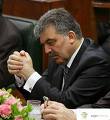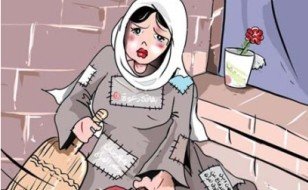The quick pace at which the ruling Justice and Development Party (AKP) acted to remove a strict ban on wearing a headscarf at universities could well have been expected to boost faith in the government's commitment to more reforms to ensure expanded freedoms to individuals, but the overall mood among Turkey's liberals is just the opposite.
No reform efforts since general elections
"Everyone was expecting two things after the elections: A civilian-drafted constitution and a stronger drive for European Union reforms," said Mehmet Altan, a columnist for daily Star. "But ever since [the parliamentary elections of] July 22, nothing has happened, with the single exception of a crackdown on Ergenekon," he added, referring to a police operation last month that revealed an ultra-nationalist gang whose members included a retired general.
Just a month ago, Prime Minister Recep Tayyip Erdogan lashed out at a ban on wearing headscarves at universities during a meeting in Spain and said headscarves should be allowed even if they are considered political symbols. The opposition Nationalist Movement Party (MHP) swiftly declared it was ready to join forces with Erdoğan's AKP if it wanted to remove the ban. In a period of a few weeks, Parliament acted with amazing speed and passed two constitutional amendments to allow students to attend classes with their headscarves on.
These amendments, when approved by President Abdullah Gül as widely expected, will remove an obstacle for many university students to exercise their right to education. But unless this step is accompanied by reforms in other areas, the government may see its alliance with Turkish and European liberals shattering.
Reforms have stagnated, universities are not free
"I wish the government would invest the same amount of energy and resolve for political reforms," Joost Lagendijk, the co-chairman of the Turkey-EU Joint Parliamentary Commission, said. "There is a concern in Europe that the headscarf will distract the government's attention and create an excuse to slow down an already slow process of political reforms. The government should push for reforms on the very well known areas. I tell them the 'headscarf is now okay, push for the others'."
Though the headscarf reform is bringing Turkey closer to having freer universities, Altan says he is stunned how the AKP seems so comfortable with other restrictions that make universities look like "military barracks," such as a provision in the Higher Education Board (YÖK) Law which states universities are obligated to "raise their students as citizens committed to Kemalist nationalism."
The two men's remarks underline a growing sense of skepticism toward the government's commitment to reform among Turkey's liberals, business circles and the EU who have so far been an honest ally for the AKP.
Close alliance with MHP
The government and President Gül have attempted more than once to assuage fears by making ambitious promises that 2008 “will be an EU year” and that “everyone will be surprised by an upcoming wave of reforms.” But skepticism remains, due to an inexplicable slowness and foot dragging in reforms and what appears to be a growing tendency on the part of the AKP to align with the MHP and the military.
In a discomforting sign that may prove the fears right, the AKP is reportedly planning to backtrack on its earlier position to grant more freedoms to minority foundations in the Foundations Law, in what appears to be a “gesture” for the MHP in return for its unconditional support in the headscarf issue.
"Deep state" still powerful
Another discomforting suspicion is that the AKP is little inclined to dig deep into a series of shadowy incidents that many say are the “work of the deep state” to silence opposition groups and stir social unrest, such as the bombing of a bookstore in Semdinli, in the southeastern province of Hakkari, in 2005 and the killing of Turkish-Armenian journalist Hrant Dink last year by an ultra-nationalist teenager.
In the first case, two gendarmerie officials caught at the scene of the bombing were released by a military court. In the second, rampant allegations and strong evidence pointing to police and gendarmerie negligence were not properly investigated despite repeated calls from EU and domestic critics. An article of the Turkish Penal Code (TCK), Article 301, under which Dink had been tried for “insulting Turkishness,” has remained untouched despite several government promises that it will be tackled soon.
Promises are not being kept
“For three years nothing has been done for Article 301, and if you consider the fact that we have been personally assured several times by the president, the prime minister and the minister of foreign affairs that ‘next week it will be done,’ then it is only natural that your patience will be running out,” Lagendijk said. “I do not want the government to make general statements, but to pass amendments.”
Lagendijk, a fervent supporter of Turkey’s membership in the EU, also rang alarm bells, saying the AKP risks losing credibility in the EU due to its repeated failure to keep reform promises. “Europeans are beginning to think that the AKP received a huge mandate at the elections and should now deliver. If the reforms do not come, I am afraid the idea of ‘hidden agenda’ will surface again,” he said, referring to criticism from the AKP’s staunchly secularist critics at home, who accuse it of having a “secret Islamic agenda” veiled by its reform drive.
TÜSIAD: EU membership is in national interest
“It is de facto equal to betraying Turkey’s interests” to keep Article 301 unchanged, said Bahadır Kaleagası, the Brussels representative of the Turkish Industrialists and Businessmen’s Association (TÜSIAD), Turkey’s largest business group. “The government should swiftly take measures to restore the EU reforms as a main priority. … Lack of action is simply a present for Turkey’s opponents in the EU.”
Asked whether the government may abandon the determination to pursue EU membership, Kaleagası warned implications of any step in this direction would be fatal for the Turkish economy. “Turkey’s EU membership is a matter of national interest,” he said.
Rudderless coalition?
According to Baskin Oran, an academic and an expert on issues of minorities and nationalism, the lack of willingness to reform may be explained by the AK Party’s heterogeneous structure, which brings together pro-reformists and anti-reform conservatives. “The foreign minister vows more reforms, but the prime minister readily dismisses calls for establishing an institute to study Kurdish issues,” he recalled. “What we have is a coalition with no single vision.”
Oran, who also ran for Parliament as an independent candidate in the July 22 elections, also said the AKP had pushed for EU reforms in its first term in government because the EU was the most likely ally that would help it withstand pressure from the military and the secularist camp at home. Its increased receptiveness to demands of the MHP and the military has been caused by a change in circumstances, he argued.
But even its most bitter critics admit the AKP is flexible and open to revise its position if it needs to. With pressure from the EU and domestic critics mounting to renew commitment to reforms, the AKP may well begin meeting the demands for change. “Given the AKP’s pragmatism, anything can happen,” said Altan. (TZ/AG)
* This article was taken from Today's Zaman, 13.02.08. Some sub-headings were added by bianet.










